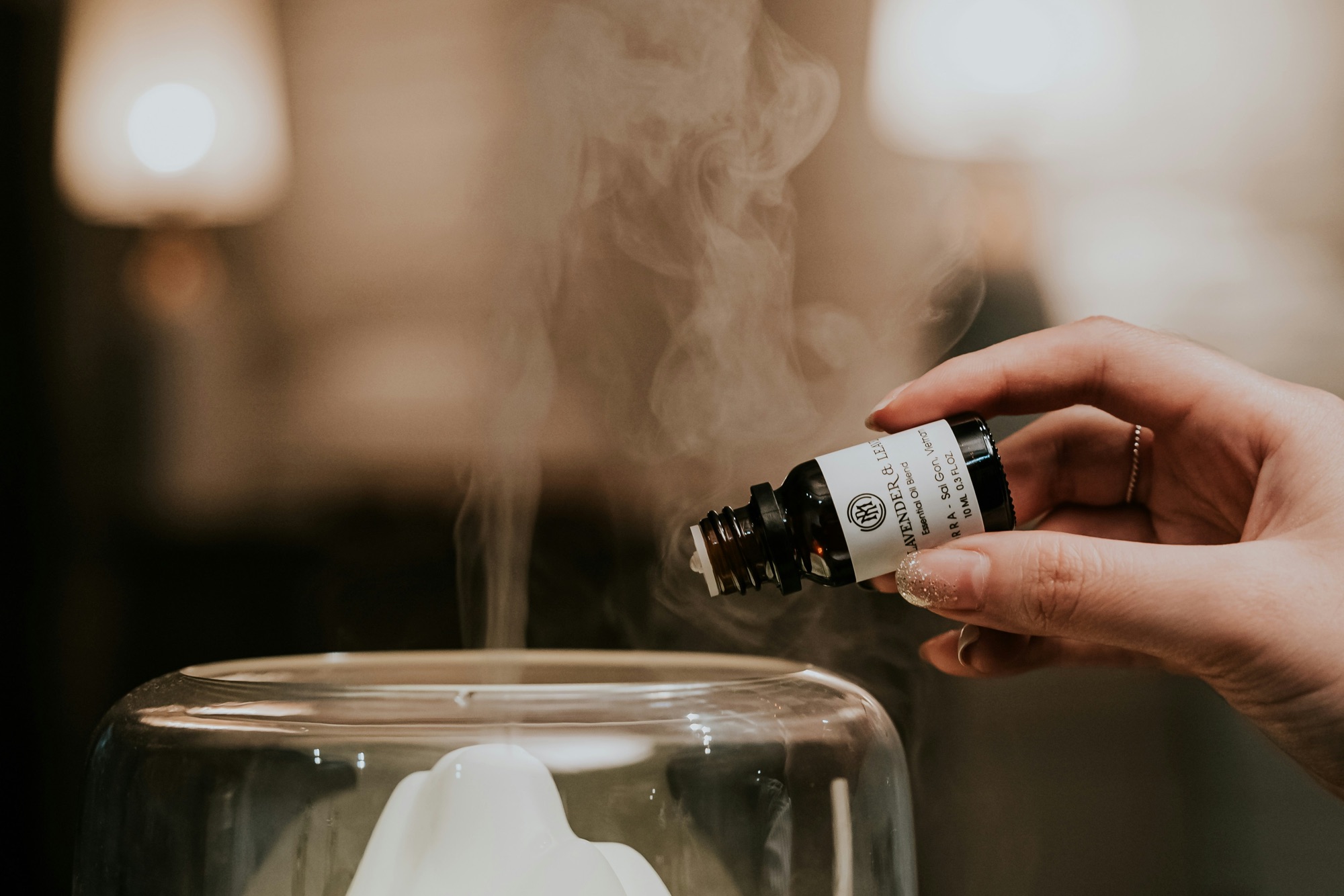Essential oils are popular for their aromatic and therapeutic benefits, from promoting relaxation to boosting mood and improving air quality. Humidifiers, on the other hand, are designed to add moisture to the air, often used to alleviate dryness in the home, especially during cold or dry weather. Given the benefits of both, many people wonder whether it’s safe to use essential oils in a humidifier.
While the combination may seem convenient, there are some important factors to consider regarding the safety and effectiveness of adding essential oils to a humidifier. Let’s explore the risks, alternatives, and guidelines for using essential oils safely with a humidifier.
1. Can Essential Oils Be Used in All Humidifiers?
How Humidifiers Work
Humidifiers are designed to increase the humidity in the air by emitting water vapor or steam. The most common types include:
- Ultrasonic humidifiers: These create a cool mist by vibrating water at a high frequency.
- Evaporative humidifiers: These use a fan to blow air through a wet wick or filter to add moisture to the air.
- Warm mist humidifiers: These boil water to produce steam, which is then cooled slightly before being released into the air.
None of these devices are specifically designed to work with essential oils. Humidifiers primarily work with water, and adding essential oils can lead to complications if the device isn’t built to handle oily substances.
Impact on the Humidifier
Using essential oils in a humidifier not designed for oils can damage the unit over time. Oils are thicker and denser than water, which can lead to issues such as:
- Clogging: Essential oils can accumulate inside the humidifier’s water tank, filters, and ultrasonic membranes, causing blockages and affecting the unit’s performance.
- Corrosion: The chemical properties of essential oils may corrode plastic components, especially in ultrasonic and evaporative humidifiers.
- Shortened lifespan: The buildup of oils can lead to malfunction, requiring more frequent cleaning and potentially reducing the lifespan of the humidifier.
2. Health and Safety Risks of Using Essential Oils in Humidifiers
While essential oils can offer health benefits when used correctly, using them in a humidifier that’s not designed for oils may introduce safety risks.
Inhalation Risks
When essential oils are used in a diffuser (a device specifically designed for dispersing oils), they are released in controlled amounts that are safe for inhalation. However, when added to a humidifier, the oils may not be evenly dispersed, leading to either too much or too little exposure.
Overexposure to essential oils can cause respiratory irritation, especially for individuals with asthma, allergies, or other respiratory conditions. Certain oils, such as eucalyptus and peppermint, can be particularly irritating to the respiratory system when inhaled in large quantities.
Mold and Bacteria Growth
Humidifiers are prone to accumulating mold and bacteria if they are not cleaned regularly, and the presence of essential oils may worsen this problem. Oils can create a residue that sticks to the inside of the humidifier, providing a breeding ground for mold and bacteria. When the humidifier is used, these contaminants may be dispersed into the air, potentially causing respiratory infections or allergic reactions.
Pet and Child Safety
Many essential oils, such as tea tree oil, eucalyptus, and citrus oils, can be harmful to pets and young children when inhaled in high concentrations. Pets, particularly cats and dogs, have a more sensitive sense of smell, and exposure to certain essential oils can lead to symptoms such as vomiting, respiratory distress, and lethargy.
For children, inhaling essential oils in large amounts can cause similar issues, including breathing difficulties or allergic reactions. It’s crucial to be cautious when using essential oils in households with pets or young children.
3. Essential Oil Diffusers vs. Humidifiers
While it’s generally not recommended to add essential oils directly to a humidifier, there are devices specifically designed to disperse oils safely: essential oil diffusers. These devices are built to handle the consistency and properties of oils, ensuring they are evenly dispersed into the air without damaging the equipment or compromising safety.
Types of Essential Oil Diffusers
- Ultrasonic diffusers: Similar to ultrasonic humidifiers, these devices use water and vibrations to disperse essential oils as a fine mist into the air.
- Nebulizing diffusers: These do not use water but instead break down essential oils into tiny particles and disperse them directly into the air, offering a stronger aroma.
- Evaporative diffusers: These use a fan to blow air through a pad or filter that contains essential oils, releasing the scent into the air.
- Heat diffusers: These use heat to evaporate the oils into the air, though they may alter the properties of the oils if the heat is too high.
Essential oil diffusers are designed to handle the properties of oils and disperse them in a way that is safe for inhalation, making them a better option than humidifiers for those looking to enjoy the benefits of aromatherapy.
4. Alternatives for Combining Essential Oils with Humidifiers
If you want to use essential oils while also running a humidifier, there are safe alternatives that can provide the benefits of both without damaging the humidifier or risking health issues.
1. Use a Separate Diffuser
The safest and most effective option is to use an essential oil diffuser separately from your humidifier. This allows you to enjoy the therapeutic effects of the oils while maintaining optimal humidity levels in your home.
2. Use a Humidifier with a Built-in Essential Oil Tray
Some humidifiers are designed with a dedicated tray or compartment for essential oils. These units separate the oils from the main water tank, ensuring that the oils do not damage the internal components of the humidifier. Check the manufacturer’s instructions to confirm that the humidifier is suitable for essential oils before use.
3. Apply Oils to External Surfaces
If your humidifier isn’t compatible with essential oils, you can still enjoy their benefits by applying a few drops to external surfaces, such as cotton balls or tissues placed near the air vents of the humidifier. This allows the scent to disperse without risking damage to the device.
4. Aromatherapy Through Steam Inhalation
Another option is to create a personal steam inhalation with essential oils. Boil water, transfer it to a heatproof bowl, and add a few drops of essential oil. Cover your head with a towel, lean over the bowl, and inhale the steam. This method provides direct exposure to essential oils without using a humidifier.
5. Cleaning Your Humidifier After Essential Oil Use
If you’ve already used essential oils in a humidifier not designed for them, it’s important to thoroughly clean the device to remove any oil residue. Here’s how to clean it properly:
- Empty the tank: Remove any remaining water and essential oil mixture.
- Wipe down all parts: Use a soft cloth or sponge to clean the inside of the water tank and other components that may have come into contact with the oils.
- Use a vinegar solution: Mix equal parts water and white vinegar, and use this solution to rinse the inside of the tank. Vinegar helps break down oils and disinfect the humidifier.
- Rinse thoroughly: After cleaning with vinegar, rinse the humidifier with clean water to ensure no residue remains.
- Dry completely: Allow the humidifier to air dry fully before using it again.
Regular cleaning of your humidifier, even when not using essential oils, is essential to prevent mold, bacteria, and mineral buildup.
Conclusion
In summary, while it may be tempting to add essential oils to your humidifier for a combined effect of moisture and aroma, it is generally not recommended unless the humidifier is specifically designed for this purpose. Using essential oils in a standard humidifier can damage the unit, compromise its effectiveness, and pose health risks due to improper dispersal and potential mold growth.
To safely enjoy the benefits of essential oils, it’s best to use a dedicated essential oil diffuser or choose a humidifier with a built-in essential oil tray. By following these guidelines, you can maintain a safe and healthy environment in your home while enjoying the therapeutic effects of essential oils.




